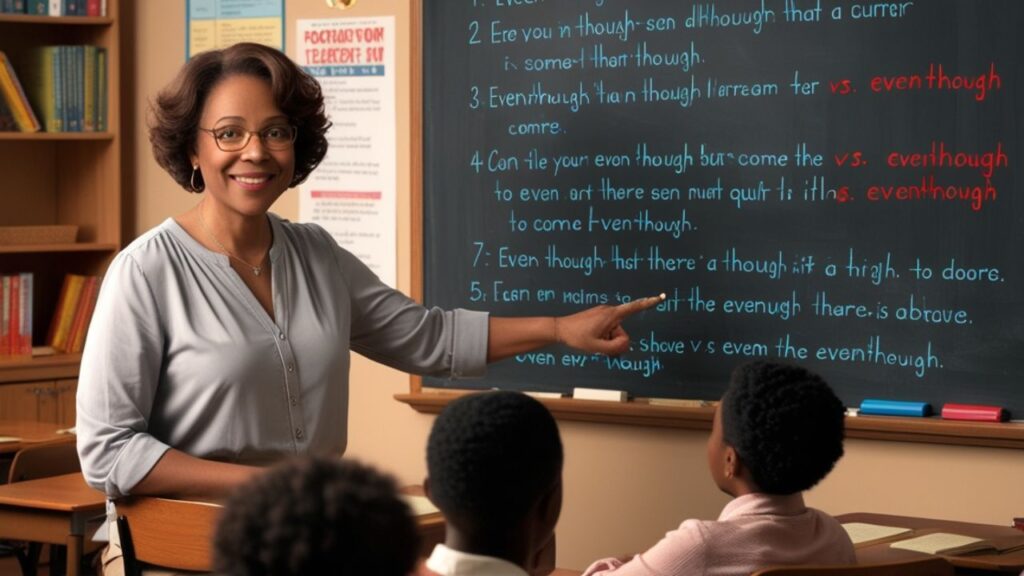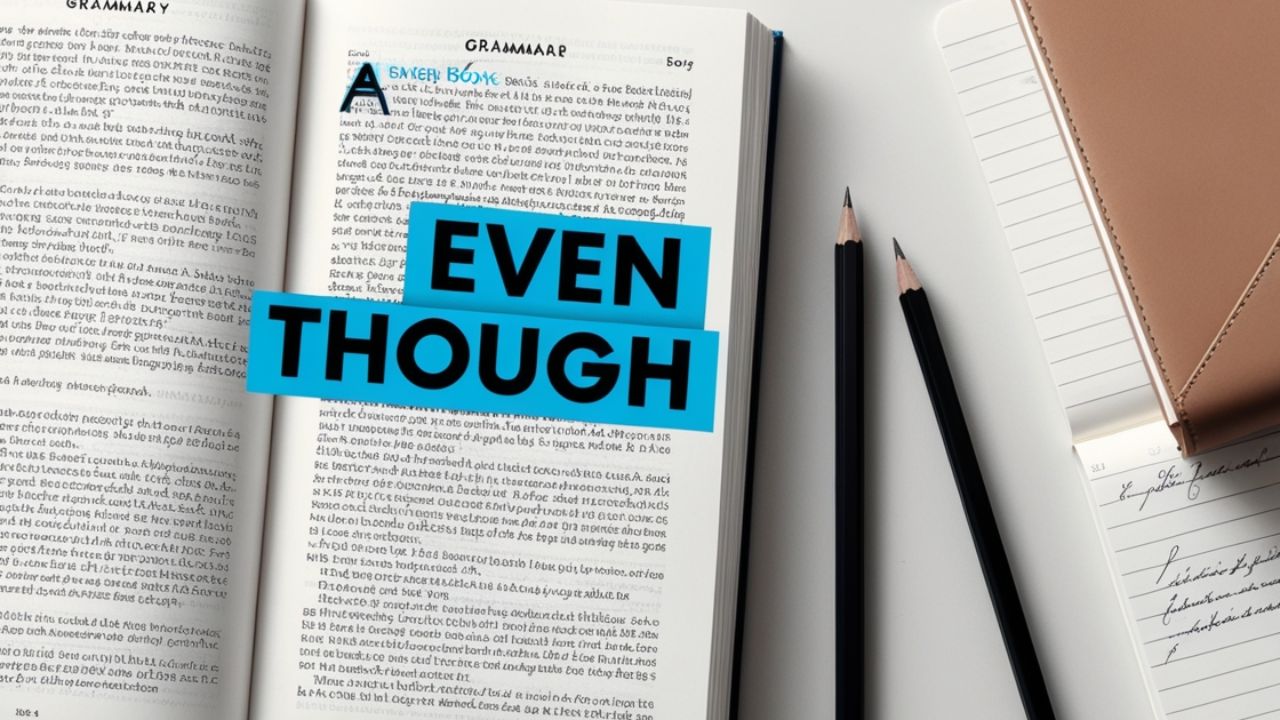Many people write eventhough because it looks like a single word. The words sound joined when spoken quickly. This makes it easy to mix them up. Correct usage always keeps them separate to show clear contrast between ideas.
Relying on autocorrect or typing fast increases mistakes. Some grammar tools may not flag the error, which makes it appear acceptable. Understanding the difference helps maintain professional writing and avoids unnecessary confusion in emails, essays, or other formal texts.
The visual similarity to other compound words tricks writers. Quick speech can make the two words sound like one. Careful reading, proofreading, and learning the correct form ensures sentences remain clear, polished, and grammatically correct.
Understanding the Confusion: Why “Eventhough” Seems Plausible
Many people think eventhough is correct because it looks similar to common compound words like everything and everywhere. The words blend naturally when spoken, making it easy to assume they should also be joined in writing.
Typing quickly or relying on autocorrect can lead to combining the words. Some spellcheck tools do not flag it clearly, which adds to the confusion. Still, this form is not recognized in any formal English dictionaries or style guides.
- Visual Similarity: It looks like common compound words such as everything, everywhere, or everyday, making it seem correct at first glance.
- Fast Speech: Saying even though quickly can make it sound like one word, which misleads writers.
- Autocorrect Reliance: Some editing tools do not flag the error, encouraging the mistaken form.
- Typing Habits: Quick or careless typing often merges the words unintentionally.
- Online Influence: Frequent use of informal digital writing spreads the misconception, even though dictionaries never recognize it.
See also : Brite vs Bright: Meaning, Definition & Correct Spelling
The Official Rule: Why “Even though” Is the Only Correct Form
“Even though” is a subordinating conjunction – a word pairing that connects a dependent clause to an independent one to express contrast or contradiction.
Here’s the breakdown:
| Word | Function |
| Even | Emphasizes contradiction |
| Though | Signals contrast |
Origin & Historical Usage of “Even though”
The phrase comes from Middle English, combining the word though and the intensifier even. Writers have used it for centuries to show contrast. Historical texts, including old English literature, always write the words separately to express clear meaning.
By the 18th century, the combination became common in both British and American English. Famous authors, including Shakespeare, consistently separated the words. This long history proves that the correct form has always been two words, connecting ideas clearly in formal writing.
- Middle English Roots: The phrase combines though and the intensifier even, used for centuries to show contrast clearly.
- Longstanding Usage: By the 18th century, it became common in both British and American English literature.
- Consistent Separation: Historical texts, including famous authors like Shakespeare, always wrote the words separately, proving the correct form is two words.
Why “Eventhough” Is Always Considered Incorrect
Let’s be blunt: “Eventhough” is not a real word. Not in American English, not in British English, not in Canadian, Australian, or any formal version of English.
Trusted Sources Say So:
| Source | Status of “Eventhough” |
| Merriam-Webster | Not listed |
| Cambridge Dictionary | Not recognized |
| Oxford English Dictionary | No entry |
| Grammarly | Flags it as a typo |
| Chicago Manual of Style | Advises correct usage: “even though” |
Impact of Incorrect Usage: Does It Really Matter?
Using the wrong form, like eventhough, can make writing look careless. In professional documents, school papers, or emails, small errors affect credibility. Readers may focus on mistakes instead of the ideas, which weakens the overall impression.
Correct usage improves clarity and shows attention to detail. Employers, teachers, and editors notice precise grammar. Maintaining proper forms strengthens writing and ensures communication is professional, polished, and easy for everyone to understand.
Here’s how it affects you:
Using incorrect forms, like eventhough, can make your writing appear unprofessional. In academic work, small mistakes may lower grades. In emails or job applications, errors reduce credibility and may distract readers from your main points.
Correct grammar shows care and professionalism. Clear, precise writing helps in business communication, resumes, and reports. Following proper rules ensures your ideas are understood easily and leaves a positive impression on teachers, employers, and colleagues.
- Professional Impression: Using incorrect forms like eventhough can make emails, essays, or reports appear careless and reduce credibility.
- Academic Impact: Small mistakes may lower grades or affect evaluations in school and university writing.
- Clear Communication: Correct usage ensures ideas are easy to understand and strengthens overall grammar and readability.
Common Misconceptions and Urban Grammar Myths
Many people believe eventhough is correct because it looks like everywhere or everything. This is wrong. The two words always stay separate to show clear contrast between ideas in formal writing and professional communication.
Another common myth is that autocorrect can fix all mistakes. Technology sometimes misses subtle errors. Learning the rules and proofreading manually improves grammar and ensures writing is clear, polished, and reliable for school, work, or online content.
- Looks Like Other Words: People think eventhough is correct because it resembles everything or everywhere, but it is not a valid compound.
- Autocorrect Misleads: Many believe editing tools always fix mistakes, yet subtle errors can go unnoticed.
- Online Usage Confuses: Frequent informal writing on the internet spreads the wrong form, even though dictionaries never recognize it.
Usage in Context: How to Use “Even though” Naturally
The best way to remember grammar? Use it in real sentences.
Examples:
| Correct Usage | Explanation |
| “Even though it rained, the event was a success.” | Shows contrast between the weather and the outcome |
| “She smiled even though she was nervous.” | Contrasts emotion with outward reaction |
| “Even though they disagree, they respect each other.” | Links two conflicting but related ideas |
Common Mistakes and What to Avoid
Even skilled writers fall into certain traps. Here’s what to watch for:
Pitfalls:
- Typing Quickly: Rushing can merge even though into eventhough, causing errors.
- Misusing Similar Words: Confusing even though with even if weakens sentence clarity.
- Ignoring Commas: Forgetting punctuation in longer sentences may make writing harder to read.
- Overreliance on Autocorrect: Editing tools sometimes miss subtle mistakes, letting errors slip through.
- Copying Online Texts: Using incorrect forms from informal writing spreads mistakes into formal work.
See also : Passerby vs Passersby: Correct Plural Explained
Fixes:
- Double-Check Writing: Always review sentences to ensure even though is written as two separate words.
- Use Grammar Tools: Programs like Grammarly or Hemingway can highlight mistakes for correction.
- Practice Reading Aloud: Hearing the words helps spot errors in spelling and structure.
- Learn from Books and Blogs: Observing proper usage in trusted sources reinforces correct writing habits.
- Slow Typing Habits: Typing carefully reduces accidental merging of words and improves overall clarity.
Pronunciation vs. Spelling: Why the Ear Tricks the Eye

When spoken quickly, even though can sound like a single word. This confuses many writers because the sounds seem to blend together. Listening closely helps distinguish each word and keeps writing clear and grammatically correct.
Relying only on how words sound can create mistakes in spelling. Careful reading and practice improve accuracy. Understanding the difference between speech and writing ensures sentences are professional, easy to read, and correctly structured in any context.
Quick Tip:
Read your writing out loud. Your mouth will often catch what your eyes missed.
Global Insight: Do Other Languages Combine This Phrase?
| Language | Translation | Literal Meaning |
| Spanish | “aunque” | Although / even though |
| French | “même si” | Even if |
| German | “auch wenn” | Even if / even though |
| Chinese (Mandarin) | “即使” (jíshǐ) | Even if / even though |
Digital Influence: Spellcheck, Autocorrect & Internet Language
While writing tools help, they’re not perfect.
Consider this:
- Grammarly Alerts: Tools like Grammarly flag eventhough as incorrect to help maintain proper usage.
- Google Docs Limitations: Some editors may miss errors, so manual checking remains important.
- Mobile Keyboards: Repeated typing on phones can autocorrect to eventhough, spreading mistakes.
- Proofreading Habit: Reviewing your text carefully ensures correct grammar and word separation.
- High-Stakes Writing: Important documents like essays, emails, or reports require extra attention to avoid errors.
Memory Tricks & Mnemonics to Remember the Correct Form
- Two Ideas, Two Words: Remember that even and though connect separate ideas, so keep them apart.
- Stepping Stones Method: Think of each word as a step—one sets up the idea, the other shows contrast.
- Say It Aloud: Pronouncing even though slowly helps reinforce correct spelling.
- Visual Reminder: Picture the two words on paper as separate to strengthen memory and clarity.
- Practice in Sentences: Using the phrase in simple examples daily makes correct usage natural and automatic.
Quick Grammar Check: When to Use “Even though” vs. Other Conjunctions
| Phrase | Use Case | Example |
| Even though | Fact that contradicts | “Even though I was tired, I kept going.” |
| Although | Slightly more formal | “Although I tried, I failed.” |
| Though | Casual/shortened | “I liked it, though.” |
| Even if | Hypothetical | “Even if it rains, I’ll go.” |
Real-Life Applications: Fixing Your Writing Instantly
How to audit your writing:
Start by carefully reading your text to spot errors like eventhough. Checking each sentence for proper grammar and word usage helps improve clarity. Highlight any confusing parts and ensure ideas flow logically for readers.
Use tools like editing software to support your review, but always double-check manually. Correcting mistakes and following standard rules strengthens writing. Regular auditing builds good habits, making your work professional, polished, and easy to understand.
Example Fix:
Incorrect writing like “eventhough she apologized, I didn’t believe her” can confuse readers and reduce clarity. Fixing it ensures the sentence clearly shows contrast between ideas and maintains professional standards in formal writing.
The correct form is “Even though she apologized, I didn’t believe her.” This keeps the words separate, strengthens grammar, and improves readability. Applying this method to other sentences makes writing polished, easy to understand, and credible in any context.
Why It Pays to Get It Right

Using the correct form, like even though, shows attention to detail and professionalism. Clear and precise writing builds trust with readers, teachers, or employers, making your work more credible and easier to understand.
Mistakes can make writing look careless. Following proper grammar rules improves communication in essays, emails, and reports. Correct usage strengthens your reputation and ensures that your ideas are presented in a polished, confident, and professional way.
Final Thoughts
Choosing the correct form, like even though, keeps writing clear and professional. Small mistakes may seem minor but can change the impression readers get. Correct usage shows careful attention and strengthens overall grammar and communication skills.
The incorrect form, eventhough, is not recognized in dictionaries or formal writing. Using proper words ensures that sentences convey ideas accurately and avoids confusion. Clear writing helps in school, work, and online communication, making ideas easy for everyone to understand.
FAQs
Which is correct, eventhough or even though?
The correct form is even though. Eventhough is a common typo and not recognized in any formal English dictionary or style guide.
Is even though 1 word or 2?
Even though is always two words. Writing it as one word is incorrect in American, British, and other standard forms of English.
How to professionally say “even though”?
You can use although or though in formal writing. These alternatives express contrast while maintaining a professional tone.
What is an example of even though?
“Even though it rained, the team finished the game.” This shows contrast between two connected ideas clearly.

Join Bibcia on a journey to master English grammar. Discover easy lessons, writing tips, and practical examples designed to make learning grammar simple and effective.










